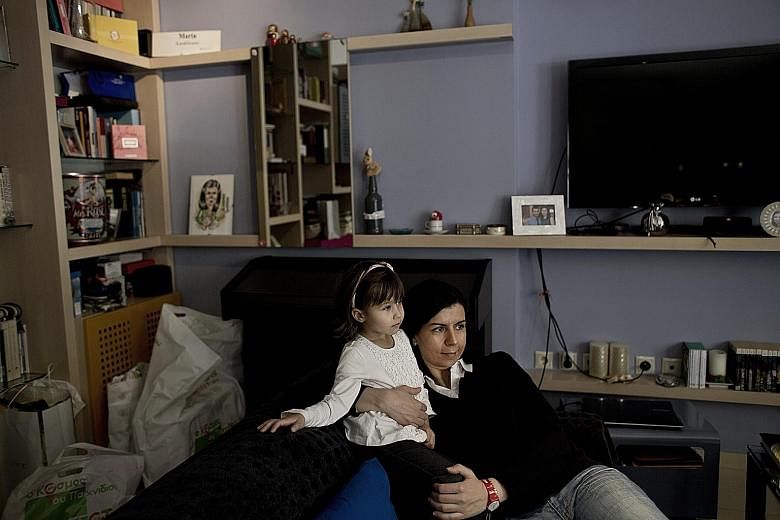ATHENS • Greek fertility doctor Minas Mastrominas has noticed an escalation of disturbing trends at his clinic: couples insisting on only one child, women renouncing plans to conceive, and a surge in single-child parents asking him to destroy the rest of their embryos.
Women across Europe have been having fewer children for decades. But demographers are warning of a new hot spot for childlessness on the Mediterranean rim, where Europe's economic crisis has had the hardest impact.
"People are saying they can't afford more than one child, or any at all," said Dr Mastrominas, a director at Embryogenesis, a large in vitro fertilisation centre. "After eight years of economic stagnation, they're giving up on their dreams."
As couples grapple with a longer-than-expected stretch of low growth, high unemployment, precarious jobs and financial strain, they are increasingly deciding to have just one child - or none.
About one-fifth of women born in the 1970s are likely to remain childless in Greece, Spain and Italy, a level not seen since World War I, says the Wittgenstein Centre for Demography and Global Human Capital in Vienna. Hundreds of thousands of fertile young people have left for Germany, Britain and the prosperous north, not likely to return unless the economy improves. Birth rates in the region are back almost to where they were before the crisis emerged in 2008.
Women in Spain had been averaging 1.47 children per household, up from 1.24 in 2000. But those gains have all but evaporated. In Italy, Portugal and Greece, birth rates have reverted to about 1.3. The current rates are well under the 2.1 needed to keep a population steady, said Eurostat, the statistical office of the European Union.
Ms Maria Karaklioumi, 43, a political pollster in Athens, decided not to have children after concluding she would not be able to offer them a stable future. She has a good job and master's degrees in politics and economics, but "there's too much insecurity", Ms Karaklioumi said.
The region is trending towards some of the lowest birth rates in the world, which will accelerate stress on pension and welfare systems and crimp growth as a shrinking workforce competes with the rest of Europe and the world.
The lower birth rates are aggravated by fiscal pressures. Whereas France offers a monthly family benefit of €130 (S$192) per child after the second child, Greece provides just €40.
Countries have recognised the problem though. Spain appointed a "sex czar" in February to forge a national fertility action plan and address population declines in rural areas. Italy increased baby bonuses and backed labour laws granting more flexible parental leave.
Greece, the weakest economic link, does not have those options.
Grandparents have traditionally been the primary source of child care, but Greek austerity policies have reduced pensions so much that the family safety net is unravelling, said Mr Dimitrios Karellas, general secretary of the Labour and Social Welfare Ministry.
Across the European south, smaller towns are increasingly hollowed out and schools emptied.
"If we don't fix this, in 20 years we'll be a country of old people," said Mr Karellas.
NYTIMES

